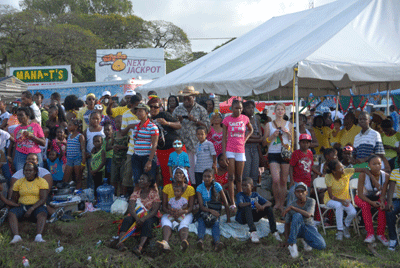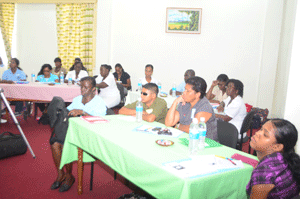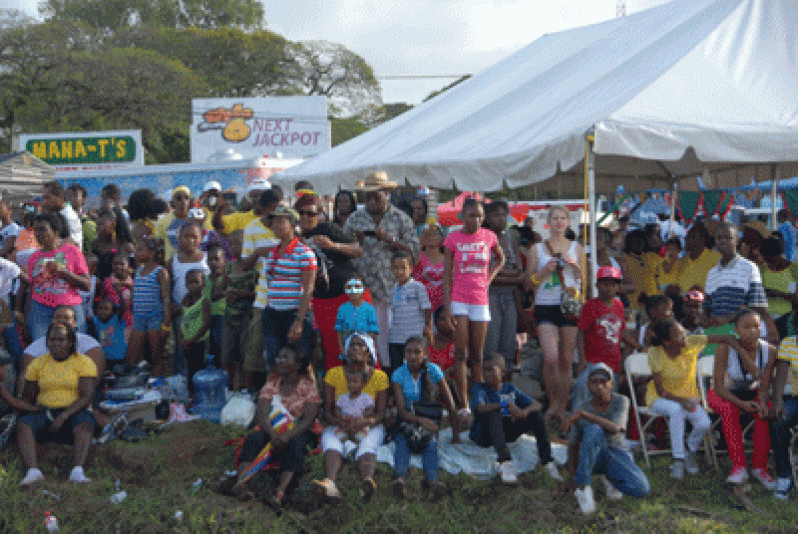THE Disability and Rehabilitation Services within the Ministry of Health, in collaboration with the United Nations Population Fund (UNFPA) started a three-day workshop Tuesday, themed ‘Understanding Sexual & Reproductive Health.
 Targeting persons living with disabilities, the rationale is it has been recognised, over the years, that persons with disability have been denied their societal rights even though there are steps in place to eliminate the stigma attached to them.
Targeting persons living with disabilities, the rationale is it has been recognised, over the years, that persons with disability have been denied their societal rights even though there are steps in place to eliminate the stigma attached to them.
Specifically in the area of sexual and reproductive health (SRH), there is a great need for those persons to become more educated in this regard and the initiative has come at a very important time, when Government and non-governmental organisations (NGOs) are striving to completely eliminate this issue in the twenty-first century.
Speaking at a session, hosted at the National Library on Church Street, Georgetown, Deputy Permanent Secretary in the Health Ministry, Mr. Trevor Thomas acknowledged the timely intervention.
He said: This comes at a time when we, at the ministry, are bringing a closure to the five-year strategic plan, reviewing it and looking at health sector strategies that will take us to 2020.”
More importantly Thomas said the ministry is receiving support from the UNFP and it is placing more emphasis on the current curriculum for the midwifery programme to ensure that proper training is imparted to deliver quality services in this regard.
He continued: “When I was speaking at the opening of this workshop, I made note that we have got to recognise that providing quality health service has many facets and the whole concept of teaching and learning is one that you have got to be constantly looking at.”
Gaps
Thomas said the review of the curriculum is to ensure that the gaps, as they relate to the situations, are filled and the requirements of the standards of the international confederation of midwifery are met.
“This is to also ensure that those who are trained as midwives can perform the services that are required in a modern society.”
Continuing, he said the ministry is looking at improving quality services and setting health standards in terms of what to guarantee the public at every level within the system.
Thomas observed that, even though in this society words are used to cushion what is the reality, sometimes, with regard to persons living with disabilities, it is not enough to soften the term disability.
“Unless we go beyond using words and actually recognise that these people have rights and ensure that, in the delivery of services, those rights are recognised, we are not moving forward,” he declared.
Therefore, Thomas contended, having this programme serves to reorient dedication towards recognising the rights of persons living with disabilities.
According to the UNFPA’s Programme Officer, Babsie Giddings, an estimated 10 percent of the world’s populations -650 million people – live with a disability and, all too often, the SRH of persons with disabilities has been overlooked by both the disability community and those working on SRH.
“Persons with disabilities have the same needs for SRH service as everyone else,” she observed.
Vulnerability
She said it is a fact that persons with disabilities may, actually, have greater needs for SRH education and care than person without disabilities, due to their increased vulnerability to abuse.
Giddings stated that the challenges to SRH faced by persons with disabilities are not necessarily part of having a disability but, instead, reflect lack of social attention, legal protection, understanding and support.
“Persons with disabilities often cannot obtain even more information about SRH, thus they remain ignorant about basic facts about themselves, their bodies and their rights to define what they do and do not want,” she asserted.
Gidding said persons with disabilities may be denied the right to establish relationships or forced into unwanted marriages, where they may be treated as housekeepers or objects of abuse rather, than as a member of the family.
“A group of persons with disabilities fit the common pattern of structural risks for HIV/AIDS and other sexually transmitted diseases, for example, high poverty rates of illiteracy, lack of access to health resources and power when negotiating safer sex,” she added.
She said persons living with disabilities are up to three times more likely than non-disabled persons to be victims of physical and sexual abuse and rape.
In her view, persons with intellectual and mental disabilities are the most vulnerable since they are, sometimes, placed in homes, hospitals, groups or other living conditions where they may not only be prevented from making informed and independent decisions about their SRH, but where they may also face an increased risk of abuse and violence.
Dependent
Additionally she said violence against persons with disabilities is compounded by the fact that the victim may be physically and financially dependent on those who abuse them.
However, research has shown that persons with disabilities are as sexually active as persons living without disabilities.
“Despite this, too often, their sexuality has been ignored and their reproductive rights denied,”Giddings said.
She pointed out that most existing policies and programmes are concentrating on the prevention of pregnancy but ignore that many persons with disabilities will, eventually, have children of their own.
“At worst, forced sterilisation and forced abortion have been imposed on persons living with disabilities. SRH services are often inaccessible to persons with disabilities for many reasons,” she said, including physical barriers, lack of disability-related clinical services and stigma and discrimination.
In many situations, these health barriers include lack of physical access to facilities such as transportation, ramps, adapted examination tables, information and communication materials, health care providers, negative attitudes, co-ordination in health centres and funding of health insurance.



.jpg)








